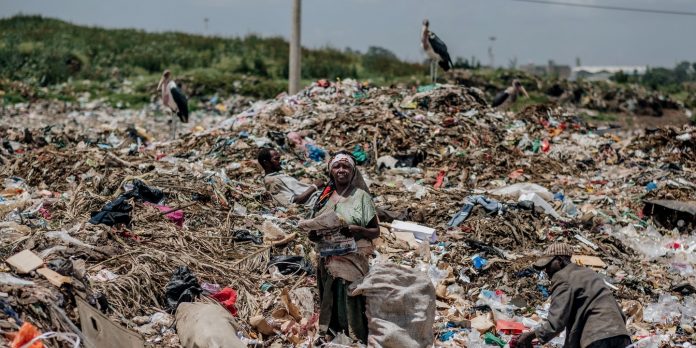Rosemary Nyambura spends her weekends collecting plastic with her aunt Miriam in the Dandora dump in Nairobi. Because the bottles they sell to other plastics traders are mixed in with discarded syringes, broken glass, feces, fragments of cellphone cases, remote controls, shoe soles, trinkets, toys, pouches, clamshells, bags, and countless unrecognizable shreds of thin plastic film, the work is time-consuming and dangerous. But Rosemary, who is 11, is hopeful that her effort will pay off.
Several of her six cousins, whom she has lived with since her mother died, have already dropped out of high school because her aunt couldn’t afford their school fees. If Rosemary makes it through elementary and secondary school, and then college and medical school after that, she vows to return to Dandora. “I see how people get sick a lot here,” Rosemary said on a recent Saturday, as she stood atop a mound of rancid trash. “If I become a doctor, I would even help them for free.”
It will take a long time for Rosemary to earn enough to pay for school with her earnings from discarded plastic. Everything that’s worth anything in Dandora, which stretches for more than 30 acres in the eastern part of the Kenyan capital, is contested. Groups of local businessmen control who trades and collects waste in the dump and even charge fees to enter certain areas. Birds, cows, and goats have staked out their own grazing spots on the mounds. And waste-pickers sometimes fight over the best finds. Discarded airplane food can spark some of the fiercest fights. Whoever wins completely devours every bit of the old, dry rolls, congealed meat, and overcooked pasta, even the contents of the tiny tub of butter, before tossing the plastic packaging onto the vast piles.
Traders who sit along the edges of the dump buy soda bottles made from PET, or polyethylene terephthalate, which Miriam gathers seven days a week, for less than 5 cents a kilogram — more than the cardboard boxes she also picks off the heaps, but far less than what they’ll pay for the same weight of metal cans. It can take many hours, even days, to collect a kilo of plastic bottles. And the bags that can fit them all, called diblas, are too big and unwieldy for children to carry. Read more…



